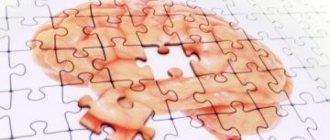Each person, to the best of his ability (and, let's be honest, desire) takes care of his health: a balanced diet, giving up bad habits, playing sports, walking in the fresh air, and getting proper rest. Many people visit a doctor at least once a year, even without any complaints or deterioration in health - this is a routine check-up, clinical tests, completely safe studies (ultrasound, fluorography, ECG, etc.). But sometimes concern about the state of one’s health takes on a clearly exaggerated, pathological character. A person constantly looks for (and finds!) symptoms of various diseases (as a rule, we are talking about severe, incurable pathologies), and turns to doctors in search of confirmation of a self-made diagnosis. Gradually, this anxiety takes on an obsessive nature - hypochondriacal depression , which requires, first of all, the help of a psychotherapist. This disorder is quite common, but only a few decide to turn to a specialist; most patients try to cope with this problem on their own. Doctors at the Leto mental health center will help overcome constant fear and anxiety and return the patient to a full life, full of pleasant events.
Etiology
To date, a hereditary predisposition to the development of depressive disorders . It is assumed that genetically determined disorders in the production of neurotransmitters, a decrease in the sensitivity of cells to their influence, lead to characteristic symptoms. Similar changes can occur as a result of organic brain damage as a result of:
- stroke;
- intoxication;
- chronic hypoxia due to alcohol and drug use;
- cerebrovascular pathologies.
However, the “impetus” for the progression of manifestations of hypochondriacal depression is usually external circumstances:
- past illness;
- diagnosed severe pathology in a relative or close friend;
- news in the media (for example, articles describing a serious disease, reports about the spread of viral and bacterial infections, etc.).
people who are self-centered and are more susceptible to depression of a hypochondriacal nature . In addition, such a disease also occurs in cases where a person cannot accept himself and his body, suffers from low self-esteem, a feeling of his own low value and worthlessness, feels guilty about something and wants to subconsciously suffer a well-deserved (as he believes) punishment . An indifferent attitude on the part of relatives plays an important role, and constant complaints about health are nothing more than an attempt to attract attention to oneself.
Treatment of hypochondriacal neurosis
The process of treating hypochondria is complex and requires an integrated approach in several stages. Measures to combat this disease are divided into psychotherapeutic and medicinal. The first includes a consultation with a psychotherapist, aimed at correcting the patient’s perception of his health and reprogramming it from negative to positive. In addition, with the help of psychotherapy, the optimal way to deal with constant stress, which often causes the development of hypochondria, is selected. Working with a psychologist helps ease the patient's fears and help him regain self-confidence. When obsessive fears appear, the patient is recommended to undergo hypnosis sessions.
Drug treatment is carried out using antidepressants, sedatives and tranquilizers. These drugs are used when neurosis occurs with accompanying dysphoria and anxiety disorders. The development of these mental pathologies cannot be ignored, since in this situation the disease can transform into severe hypochondriacal syndrome.
Clinical picture
The main symptom of hypochondriacal depression is worries about one’s own health. The patient constantly listens to internal sensations; the slightest discomfort, and even more so, pain, causes a deterioration in mood, even leading to a panic attack. A person temporarily completely loses interest in work/study/everyday activities and “switches” to searching for information about what this or that symptom means.
In this case, minor diseases are immediately “swept aside”. The patient does not think that, for example, discomfort in the abdomen can only be a consequence of overeating, poor diet, or digestive disorders. Immediately thoughts come to mind about oncology, perforated ulcers , and other similar serious diseases. Complaints of pain in the heart area are also typical.
A person consults a doctor if there is any slight deterioration in health. A monotonous, emotionally unexpressed presentation of complaints is typical, but the patient only expects confirmation from the doctor of the alleged diagnosis. If this does not happen, he easily becomes emotional, tries to prove that he is right, and demands various, often technically complex, expensive and unnecessary, from the point of view of a specialist, examinations.
But even negative results of a comprehensive comprehensive diagnosis either do not bring relief or provide only a short-term effect. After a certain time everything starts again.
In addition to complaints about well-being, hypochondriacal depression is characterized by:
- apathy;
- sad, depressed state;
- monosyllabic quiet speech;
- disinterest in the results of their work;
- neglect of household duties;
- indifference to appearance, sloppiness;
- decrease in social activity, desire for solitude, and attempts to “stir up” a person, “pull” him out for a walk, etc. can cause an outburst of anger and irritation.
With hypochondriacal depression, attempts at self-medication are extremely dangerous. For example, fearing a heart attack, a patient may start taking antithrombotic, antiarrhythmic or antihypertensive drugs, fearing a bacterial infection - antibiotics. Uncontrolled use of any drugs, and especially potent drugs, is fraught with severe complications and side effects.
In addition, we should not forget about developing concomitant diseases. Due to growing tension and anxiety, sleep deteriorates, and a constant feeling of weakness and weakness appears. Against the background of permanent stress, various cardiovascular disorders develop and periodic headaches occur. Doctors often encounter hyperthermia of a neurological nature. If you do not consult a specialist in a timely manner, exaggerated somatic symptoms can develop into real diseases.
Hypochondria (hypochondriacal disorder) - symptoms and treatment
The pathogenesis of hypochondriacal disorder is still not fully understood. There are many hypotheses and opinions on this issue. Professor, Doctor of Medicine, proposed his hypothesis of pathogenesis. Department of Psychiatry, Faculty of Training and Teaching Staff, Novosibirsk State Medical Academy, Gennady Timofeevich Krasilnikov.[8] In one of his works, he showed that there are two aspects at the basis of the hypochondriacal condition. These are neurophysiological factors (somatogenesis) and psychological and socio-psychological factors (psychogenesis). If the pathogenesis of hypochondriacal disorder is considered from the perspective of somatogenesis, then we can come to the conclusion that the analysis of interoreception is pathological. Krasilnikov suggests that a person’s sense of his body is due to a huge flow of information from interoreceptors (receptors from internal organs), which closes below the threshold of consciousness, and thereby creates an integrative bodily well-being. Autonomous vegetative processes usually occur outside of conscious control, based on information from proprio- and visceroreceptors. In particular, our consciousness is focused on signals from exteroceptors, which form the information base for external activity. Disruption of interoceptive signaling can occur at various levels: receptor, hypothalamic, cortical. Therefore, various mechanisms are likely that cause pathology of self-perceptions. Consequently, everything that increases the activity of interoreception and lowers the threshold of its conscious perception creates the neurophysiological basis for hypochondriacal symptom formation, for example, overwork, somatogenic asthenia, vegetative-vascular dystonia, etc.
The psychogenesis of hypochondria can be understood from the fact that a person can feel sick not only from disorders of the gastrointestinal tract or other bodily disorders, but also from troubles at work, material losses, sexual failures, etc.
The participation of the psychological factor can be ambiguous and multifaceted. In neurosology, hypochondriacal response is recognized as one of the mechanisms of secondary neurotic defense of the individual. The protective meaning is that the search for recognition of the disease and treatment mitigates the primary pointless fear and anxiety caused by an unconscious (repressed) intrapsychic conflict. In addition, the hypochondriacal symptom complex brings relief in that by accepting the role of the sick person, a person is, as it were, transported to childhood, and this role frees him from many unpleasant everyday responsibilities and imposes obligations on others to provide attention and care.[8]
Diagnostic methods
Unfortunately, people usually come to our clinic in the later stages of the disease after endless and fruitless consultations with highly specialized specialists. For diagnosis, special questionnaires and questionnaires are used. The psychotherapist’s task is to exclude other forms of depressive disorders, psychoses, and age-related neuropsychiatric disorders.
Immediately after confirmation of the diagnosis, we recommend starting a course of psychotherapy. However, if the patient's symptoms persist after 2–3 weeks, it is better to undergo a repeat diagnostic examination to rule out concomitant diseases.
Diagnosis of the syndrome
Diagnosing the disease is not so easy because patients are actually convinced that they have physical abnormalities. We will help eliminate this destructive obsessive factor. If necessary, the patient may be referred for consultation to a highly qualified psychologist or psychiatrist. It is necessary to exclude the physical component of the disease and look at the patient’s reaction. To confirm the diagnosis, testing is used and there is a need to consult with colleagues
Cost of services
| CONSULTATIONS OF SPECIALISTS | |
| Initial consultation with a psychiatrist (60 min.) | 6,000 rub. |
| Repeated consultation | 5,000 rub. |
| Consultation with a psychiatrist-narcologist (60 min.) | 5,000 rub. |
| Consultation with a psychologist | 3,500 rub. |
| Consultation with Gromova E.V. (50 minutes) | 12,000 rub. |
| PSYCHOTHERAPY | |
| Psychotherapy (session) | 7,000 rub. |
| Psychotherapy (5 sessions) | 30,000 rub. |
| Psychotherapy (10 sessions) | 60,000 rub. |
| Group psychotherapy (3-7 people) | 3,500 rub. |
| Psychotherapy session with E.V. Gromova (50 minutes) | 12,000 rub. |
| TREATMENT IN A HOSPITAL | |
| Ward for 4 persons | 10,000 rub./day |
| Ward for 3 persons | 13,000 rub./day |
| Ward 1 bed VIP | 23,000 rub./day |
| Individual post | 5,000 rub. |
| PETE | 15,000 rub./day |
This list does not contain all prices for services provided by our clinic. The full price list can be found on the “Prices” , or by calling: 8(969)060-93-93. Initial consultation is FREE!
Diagnosis of hypochondriacal neurosis
To identify hypochondriacal neurosis in a patient, the doctor conducts a detailed conversation with him about his condition and listens to complaints. Next, the information received must be compared with the results of the examination and all tests performed. These are various types of blood and urine tests, an electrocardiogram and other measures prescribed at the discretion of the specialist.
Based on the data obtained after the examination, the doctor makes a conclusion about the condition of the patient’s body. If necessary, additional examinations may be prescribed, the list of which includes ultrasound diagnostics, X-ray examination, and consultations with specialists of a narrow profile.
If, based on the results of all the checks carried out, doctors do not find any pathologies of internal organs in the patient, he is referred to an appointment with a psychotherapist to confirm suspicions of hypochondriacal neurosis.
Treatment
Psychotherapy sessions are conducted both individually and in groups. Therapeutic effects are aimed at:
- reduction of anxiety;
- behavior correction;
- increased self-control;
- training in relaxation techniques;
- improvement of psychological well-being;
- increasing self-esteem.
Rational psychotherapy,
, has a good effect . The doctor tells the patient in detail what hypochondriacal depression is and explains the need for treatment.
But in severe cases of the disease, psychotherapy alone is not enough. Doctors at our clinic prescribe (necessarily with individual dose selection):
- antidepressants;
- benzodiazepine tranquilizers;
- mood stabilizers and anxiolytics;
- neuroprotectors, etc.
You can get more detailed information about the treatment of hypochondriacal depression at the Leto clinic from our operators by calling 24 hours a day 8(969)060-93-93.
SENESTOPATIC-HYPOCHONDRIC SYNDROME
SENESTOPATIC-HYPOCHONDRIC SYNDROME is observed in neuroses, psychopathy, schizophrenia, organic diseases of the central nervous system, as well as in various depressions. Hypochondria is manifested by excessive attention to one’s health, preoccupation with even minor ailments or the belief in the presence of a serious illness, and disturbances in the physical sphere. Hypochondria is often combined with a variety of extremely unpleasant sensations - senestopathies. In some cases, senestopathies dominate the clinical picture, representing an independent syndrome.
The psychopathological structure of hypochondriacal conditions is different. With obsessive hypochondria, anxious fears about the presence of some disease predominate (cardiophobia, cancerophobia, fear of some unrecognized disease), combined with massive vegetative symptoms, algia, tremor, chills, and fainting. In cases of hypochondriacal depression, depression is combined with a feeling of hopelessness, conviction of the presence of a serious illness, and fear of death. In the first place in the clinical picture are numerous somatic complaints, various unpleasant sensations (a feeling of diffuse pressure, heaviness in the abdomen, burning in the chest), persistent sleep and appetite disturbances. When hypochondria becomes overvalued, there is a persistent fixation on pathological sensations, which is combined with active efforts to overcome them, often taking the form of litigiousness. In some cases, all the activities of patients are aimed at restoring what they consider to be disturbed health. These goals are served by strict adherence to the regime, regular medication intake, numerous medical procedures, and various measures to harden the body.
In the picture of delusional hypochondria, the conviction of the presence of some disease is based on an ever-expanding system of “evidence.” Patients claim that their body is affected by an infection or other harmful agent, and the onset of the disease is sometimes associated with exposure to radiation or electric current. Despite negative test results, patients require more and more research; insisting on establishing a diagnosis, they turn to various authorities, accusing doctors of negligence, and sometimes even of malicious intent, who refuse to conduct further examination.










